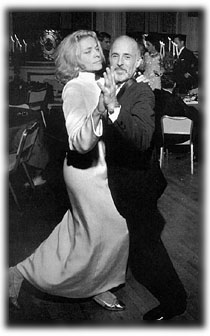Main Menu · Search ·Current Issue ·Contact ·Archives ·Centennial ·Letters to the Editor ·FAQs
 At Capote's black-and-white ball, Lauren Bacall, dancing with famed choreographer Jerome Robbins, is poised to snub Arthur Schlesinger Jr. From Truman Capote. At Capote's black-and-white ball, Lauren Bacall, dancing with famed choreographer Jerome Robbins, is poised to snub Arthur Schlesinger Jr. From Truman Capote. Photograph by HENRY GROSSMAN |
Truman Capote: In Which Various Friends, Enemies, Acquaintances, and Detractors Recall His Turbulent Career, by George Plimpton '48 (Doubleday/ Talese, $35). Anecdotal testimony from scores of luminous or at least loquacious people, deftly marshaled by master raconteur Plimpton, produces a profile with the appeal of the most captivating gossip and, one suspects, the accuracy that only multiple perspectives can attain. Plimpton devotes much space and many photographs to the black-and-white ball at the Plaza in 1966 to which Capote invited a multitude of glitterati. Among them was historian Arthur Schlesinger Jr. '38, who reports on the experience as follows: "I saw Betty Bacall dancing out on the floor. I've known her for years. So I went and started to cut in. She looked at me with considerable scorn and said, 'Don't you see whom I'm dancing with?' And I looked, and it turned out to be Jerry Robbins, whom I had never met. So I retired crestfallen."
Defending the Spirit: A Black Life in America, by Randall Robinson, J.D. '70 (Dutton, $25.95). A memoir by the founder and president of TransAfrica, the lobby for the interests of African and Caribbean peoples. It was at Harvard Law School that Robinson realized he couldn't bring himself to practice corporate law. He calls the place "the school that gave the term 'self-absorption' institutional meaning."
A Surgeon in Combat: European Theatre--World War II, Omaha Beach to Ebensee, 1943-1945, by William V. McDermott '38, M.D. '42, Cheever professor of surgery emeritus (William L. Bauhan, $27.50). Just out of medical school, McDermott landed at Omaha Beach with the second wave and served as a combat surgeon during the great land battles of World War II. This lively, illustrated memoir, based on letters the author sent from the front to his bride at home, ends when he enters the liberated Nazi concentration camp at Ebensee totally unprepared for the horrors he finds.
The American Opera Singer: The Lives and Adventures of America's Great Singers in Opera and Concert, from 1825 to the Present, by Peter G. Davis '58 (Doubleday, $40). A fat book, by no means all about fat ladies. Consider Mary Garden. Debussy called her "divine" and felt she had been sent to him "from the mists of the north" to create his otherworldly Mélisande. A literate, entertaining work from the music critic of New York magazine. A companion two-CD set of the same title is available in record stores.
The Fall of Che Guevara: A Story of Soldiers, Spies, and Diplomats, by Henry Butterfield Ryan, M.P.A. '72 (Oxford University Press, $27.50). Documents obtained through the Freedom of Information Act have allowed Ryan, a retired Foreign Service officer and an historian, to tell for the first time the role of the U.S. government in foiling Guevara's final campaign to ignite a revolution in the backwoods of Bolivia.
Loosing the Bonds: The United States and South Africa in the Apartheid Years, by Robert Kinloch Massie, D.B.A. '89 (Doubleday/Talese, $40). "It is impossible not to get caught up in the epic sweep of [this] narrative," writes historian Doris Kearns Goodwin, Ph.D. '68, IOP '91. "Blending brilliant portraiture with illuminating insights into how the South African struggle has mirrored America's racial dilemmas, Loosing the Bonds is narrative history at its very best." From 1989 to 1996, Massie taught at the Divinity School, where he ran the Project on Business, Values, and the Economy.
To Seek Out New Life: The Biology of Star Trek, by Athena Andreadis '77, assistant professor of neuroscience (Crown, $21). What humanoid species are unable to breed (and why could Mr. Spock not have existed)? Where does consciousness go when life-forms are put through the transporter? Why could the Trill symbiont Dax never fall in love with the Klingon Worf?
Oriental Rug Symbols: Their Origins and Meanings from the Middle East to China, by John Train '50, M.A. '51 (Antique Collectors' Club, $40). Well known for his writing on financial matters, Train here makes sense of the various animals, birds, flowers, trees, and other items that adorn the rugs we tromp on, often without seeing or understanding what they have to show us.
Letters to Kennedy, by John Kenneth Galbraith, Warburg professor of economics emeritus, edited by James Goodman (Harvard University Press, $24.95). One of the president's close advisers, Galbraith counseled about economics, public policy, the federal bureaucracy, and--when the professor was ambassador to India--foreign policy. All communications bear evidence of Galbraithean literary grace and wit. At the end of a letter about Vietnam, posted in New Delhi, he wrote, "I have been dictating this in the plane coming back from Mysore where I have been getting an honorary degree. My rule on these used to be to have one more than Schlesinger. However, I am here caught up in an uncontrollable flood of academic distinction."